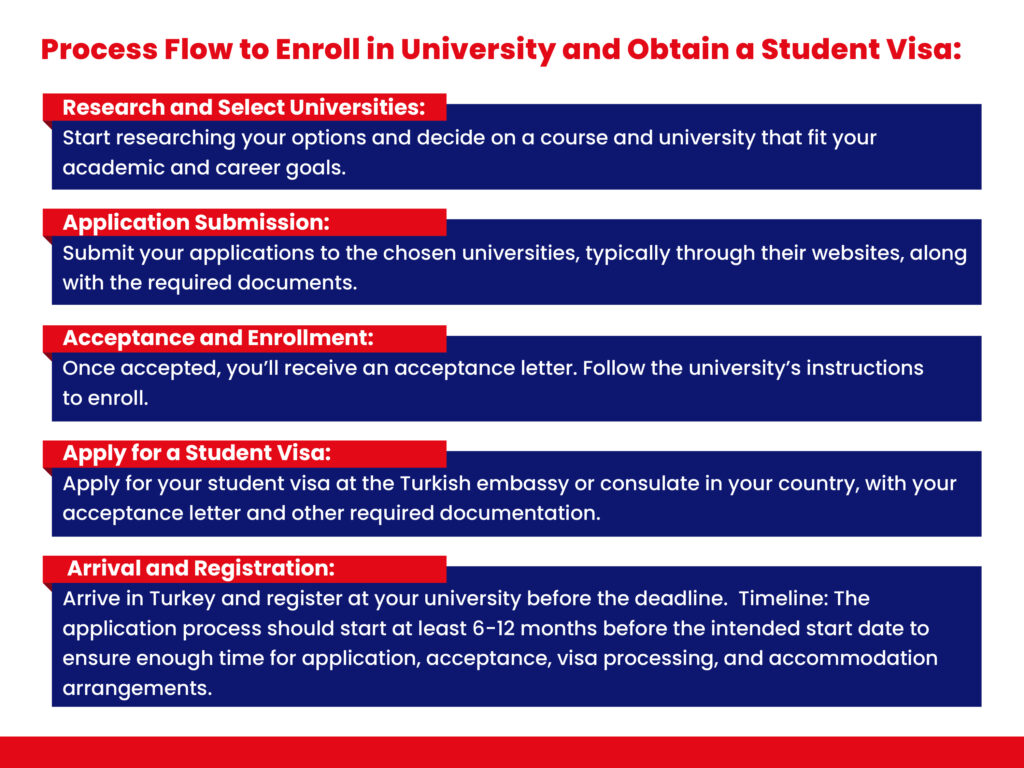
Why Study in Turkey?
- Geographical and cultural bridge between East and West, with a rich history and diverse cultural experiences.
- SUN Consulting specializes in representing world recognised Turkish univeristies with affordable costs that rank between the top 50-250 top global universities.
- Modern and high-quality education system along with degrees that are internationally recognized.
- Affordable living costs compared to many Western countries. There is a promising pathway to German work permit leading to German citizenship.
- Opportunities for learning Turkish, a language with historical and cultural significance. SUN Consulting offers online Turkish language courses and post graduation support for Canadian or German student visas.



Admission Process
- This is an overview of the application process for Turkish universities.
- Document requirements and deadlines.
- Guidance on standardized tests.
- Support services offered by : Sun Consulting Pvt. Limited.
Turkish Pathway Process
Completion of a degree from Turkey
(Bachelor’s or Master’s)
Apply for a Turkish Work Visa
Secure a full time or part time job in Turkey
German Pathway Process
Completion of a degree from Turkey (Bachelor’s or Master’s)
Secure a job in Germany to obtain a Work Visa
German citizenship leads to EU Passport
Turkish Admission process
Collection of relevant documentation
Completion of Language Requirements ILETS, TOEFL, English Proficiency test via University of intrest )
Application Submission
Recieve admission offer letter
Processing time: 3 weeks
Collection of relevant documentation
Completion of language requirements
Application Submission
Processing time: 3 weeks
Success Stories
- There are several success stories of Pakistani students who have gone to study abroad via SUN Consulting.
- They have had achievements, experiences, and career paths post-graduation.
Arsalan Ahmad
Sun Consulting has been my choice of immigration consultant because of their professional, thorough and honest way of processing the cases. The consultants give you help whenever it is needed. Very well-handled process. Would highly recommend!

Hammad Sheikh
Excellent Services. I was really impressed by their team and was well recommended from Sun Consulting. Thanks for helping and sharing good opinions for betterment in the student immigration process.

Faizan Ansari
I am really Thankful to Team Sun Consulting. They guide me with perfection about student visa process for bachelor's degree. Thanks again

Hammad Sheikh
I had a problem with my visa process, and these guys were straightforward with my problem and gave me a quick solution, compared to other consultants who just wasted my time and/or wanted to restart my whole visa process. I could never recommend these guys more than enough, they saved my career.

Pathway to Germany
Your Bridge to German Education and Beyond
- Overview of pathways to Germany
- Lucrative masters programs and employment available in various fields including engineering, social sciences, medicine, architecture, and AI.
- CBS - Cologne Business School for English-language programs
- Summer camp opportunities for hands-on experience
Germany Student Visa and Block Account Information
- CGPA and IELTS requirements, block account details, and cost breakdown
- Importance of acceptance letters, financial resources, and health insurance
- Information on the post-study work visa and considerations for international students
- We highly encourage targeting universities within a 2-year gap from bachelor's

Why Start in Turkey?
- Lower living costs in Turkey allow for high-quality education without significant financial burden.
- Turkish institutions offer a robust academic foundation, ensuring graduates are well-prepared for advanced studies or professional work
- Starting education in Turkey provides a strategic and culturally enriching experience before transitioning to Germany.
- Begnning in Turkey facilitates a smoother transition to the German education system and work environment, enhancing the chances of obtaining a work visa.
- Turkey's diverse international student community, exemplified by OKAN's international student population, allows students to build a global network.
- Sun Consulting's affiliations with academic institutions in the region, reinforces the support network available to students in Turkey.
EU Passport Opportunities
EU Passport Opportunities
Sun Consulting your Pathway to EU Citizenship
- Sun Consulting's offers support in facilitating pathways to German citizenship
- Mention of the EU passport opportunities through the German work permit
- Overview of the benefits of obtaining German and EU citizenship

What are the admission requirements for studying in Germany?
Admission requirements vary depending on the program and university you are applying to. Generally, undergraduate programs require a recognized secondary school leaving certificate, while graduate programs require a bachelor’s degree or equivalent. Additionally, universities may require proficiency in the German language or proof of English language proficiency if the program is taught in English. A minimum GPA or academic score may also be required.
What language requirements are needed for studying in Germany?
The language requirements depend on the program and university you are applying to, for programs taught in English, universities may require proof of English language proficiency, such as a TOEFL or IELTS score.
Can I work while studying in Germany?
Yes, international students are allowed to work while studying in Germany. However, there are restrictions on the number of hours they can work per week, typically up to 20 hours per week during the academic year and full-time during semester breaks. Some programs may not allow students to work during the academic year. Students should also make sure they have a valid work permit before starting any employment.
How long does it take to get a student visa for Germany?
The time it takes to get a student visa for Germany varies depending on the country you are applying from and the workload of the German embassy or consulate in that country. It is recommended to start the visa application process at least three months before your planned arrival in Germany. The application process typically involves submitting a completed application form, passport photos, a valid passport, proof of financial resources, health insurance, and other required documents.
Do I need health insurance to study in Germany?
Yes, health insurance is mandatory for all international students in Germany. You can either purchase insurance in your home country or buy it after you arrive in Germany. Some universities may also offer health insurance plans for students.
What are the tuition fees for studying in Germany?
Most universities in Germany do not charge tuition fees, even for international students. However, some universities may charge administrative fees or fees for certain programs. Students should also be prepared to cover other expenses, such as accommodation, food, transportation, and personal expenses.

